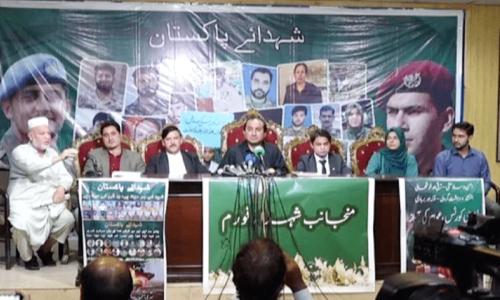The upper house of Parliament on Monday passed a resolution backing the military trials of civilians arrested in the wake of violent protests in the country on May 9.
The non-binding resolution, a copy of which is available with Dawn.com, was tabled by Senator Dilawar Khan at the tail-end of today’s session. PPP Senator Raza Rabbani and Jamaat-i-Islami Senator Mushtaq Ahmed opposed the resolution.
Led by Justice Ijazul Ahsan, a five-member Supreme Court (SC) bench comprising Justice Munib Akhtar, Justice Yahya Afridi, Syed Mazahar Ali Akbar Naqvi, and Justice Ayesha A Malik on October 24 had declared unconstitutional by a majority of 4-1 the military trials of civilians for their alleged role in attacks on army installations on May 9.
The bench unanimously emphasised that the cases of the accused involved in the May 9 riots would proceed before criminal courts.
The court had also declared Section 2(1)(d) of the Army Act, which elaborates on persons subject to the Act, to be in violation of the Constitution and “of no legal effect”. Further, the court had declared Section 59(4) (civil offences) of the Act to be unconstitutional. Justice Afridi disagreed with striking down the sections.
At the time, Attorney General for Pakistan (AGP) Mansoor Usman Awan had told Dawn that the government would file an appeal against the decision. However, the appeal has not yet been filed.
The resolution tabled in the Senate today said that “prima facie an attempt has been made to rewrite the law by impinging upon the legislative authority of Parliament”.
It reiterated that the trial of those accused of violence against the armed forces under the Army Act was an “appropriate and proportional response in line with Pakistan’s existing constitutional framework and statutory regime”.
“Within the country’s constitutional framework, the trial of individuals accused of anti-state vandalism and violence under the Army Act serves as a deterrent against such acts,” it said.
The resolution also expressed solidarity with the families of martyrs, which it said had “expressed feelings of insecurity and treachery” due to the court’s decision.
“Their concern that absence of military court trial is likely to encourage or embolden those responsible for acts of terrorism due to [a] lack of stringent justice in regular courts is fully endorsed,” the resolution said.
It noted that the SC verdict “annuls the sacrifices made by martyrs” in combatting terrorism.
“Military courts have played a significant role in addressing terrorism by ensuring that those responsible for terrorist acts are brought to justice. However, this judgment, while abandoning the spirit of martyrdom, grants lenient option to terrorists, anti-state actors, foreign agents, and spies to be tried in normal courts,” the resolution said.
The resolution said the SC had not taken into consideration “existing procedures which make it abundantly clear that the sentences given by military courts are not arbitrary and are conducted following due process and formalities”.
It added that the existence of an appeal process against the verdicts issued by military courts was also overlooked. “The provisions of the Army Act and underlying procedures ensure that the right to a fair trial under Article 10-A of the Constitution is not violated,” it said.
The resolution reaffirmed that May 9 would be remembered as a “dark day in the history of the country”. It also condemned the “anti-state acts” committed against the armed forces, “which the enemies of Pakistan cannot even dare to think of committing”.
“The culprits of May 9, who blatantly attacked defence installations and disgracefully dismantled memorials of martyrs deserve no empathy or leniency, rather they should be tried in military courts and stringent punishments [should] be given to make them an example for internal and external enemies [of] Pakistan by creating deterrence and upholding the supremacy of state,” the resolution said.
It said that Section 2(1)(d) was added to the Army Act in 1967, and civilians had been tried in military courts in the past under the provision while sentences were also carried out.
It added that a previous SC verdict had upheld trials under the Army Act by a majority. On the other hand, the bench which announced the recent verdict was “not in unanimity as opposed to previous benches which upheld trials of civilians under the Army Act, hence the decision is legally flawed and should not be implemented unless it is considered by a larger bench”, the resolution said.
It said that the “invalidation of the jurisdiction of army courts is likely to facilitate vandals and abettors of terrorism and anti-state activities.”
“The Senate of Pakistan calls upon the apex court to reconsider its decision, urging alignment with the national security paradigm and [the] sacrifices of the martyrs in order to address the concerns raised regarding the ramifications of the judgement on the security and stability of the nation,” the resolution said.
On May 9, PTI chief Imran Khan was arrested by the National Accountability Bureau (NAB) with the help of the paramilitary Rangers at the Islamabad High Court in the Al Qadir Trust case. The development had sparked countrywide protests amid incidents of vandalism and violence.
During the protest, military installations — including the Lahore corps commander’s residence — and state properties were damaged across Pakistan.
Following the episode, the military had termed the day a “dark chapter” in the country’s history and resolved to bring to justice all those involved in the vandalism. It had sacked three army officers, including a lieutenant general, as a part of its “self-accountability process” into the events of May 9














































Dear visitor, the comments section is undergoing an overhaul and will return soon.